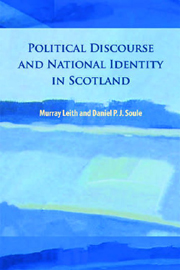Book contents
- Frontmatter
- Contents
- List of Tables and Figures
- Acknowledgements
- Preface
- 1 Whose Nationalism is it Anyway?
- 2 The Politics of Contemporary Scottish Nationalism
- 3 The Changing Sense of Scotland: the Political Employment of National Identity
- 4 Nationalism's Metaphor: the Discourse and Grammar of National Personification
- 5 Mass Perceptions of National Identity: Evidence from Survey Data
- 6 Narratives of Identity: Locating National Identity in the Public's Discourse
- 7 The Scottish Political Elite View of National Identity
- 8 (Re)describing Scottish National Identity
- Bibliography
- Appendix
- Index
4 - Nationalism's Metaphor: the Discourse and Grammar of National Personification
Published online by Cambridge University Press: 05 August 2013
- Frontmatter
- Contents
- List of Tables and Figures
- Acknowledgements
- Preface
- 1 Whose Nationalism is it Anyway?
- 2 The Politics of Contemporary Scottish Nationalism
- 3 The Changing Sense of Scotland: the Political Employment of National Identity
- 4 Nationalism's Metaphor: the Discourse and Grammar of National Personification
- 5 Mass Perceptions of National Identity: Evidence from Survey Data
- 6 Narratives of Identity: Locating National Identity in the Public's Discourse
- 7 The Scottish Political Elite View of National Identity
- 8 (Re)describing Scottish National Identity
- Bibliography
- Appendix
- Index
Summary
Introduction
Social and political change over the last forty years has altered the role national identity plays in Scottish politics, particularly when Scottishness is measured against Britishness over the same period. This chapter continues to explore how language is used to represent Scotland within the electoral discourse contained in the manifestos of devolved Scottish politics. The previous chapter introduced for the first time a measurement for national identity similar to other policy preferences measurable on a left-right spectrum. With the increasing emphasis on Scottish national identity, it is legitimate to ask what these ideological interpretations of Scotland look like. How do the different parties construct Scotland in their discourse? For example, it has been asserted that Labour and the SNP have been successful, at least in recent times, in linking in the public mind centre-left social democratic values with Scottish national identity to the extent that right-wing Conservatism has often been associated with Englishness. As such, the Scottish Conservatives find themselves ideologically isolated in Scotland (McCrone 2001). Here we examine how the four major parties of Scotland draw on any civic and non-civic sources in their conceptions of the Scottish nation and Scottish national identity. The analysis will explore statements from the manifestos in more detail to investigate the character of these discursive constructions of Scotland and Scottish national identity. In particular, we will look at the linguistic phenomenon of the metaphorical personification of the nation and its banal discursive manifestations.
Information
- Type
- Chapter
- Information
- Political Discourse and National Identity in Scotland , pp. 62 - 80Publisher: Edinburgh University PressPrint publication year: 2011
